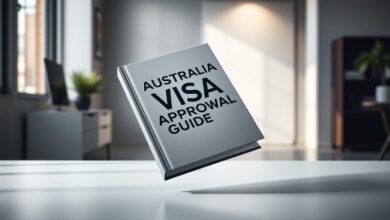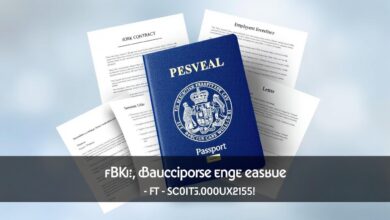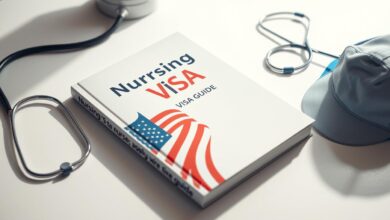Visa Sponsorship in Singapore: What to Expect and How to Get Started the Right Way
Visa sponsorship in Singapore is key for foreign workers looking for jobs. This guide helps clear up the visa application process.
Anúncios
It explains what sponsors and applicants need to know.
Knowing how the sponsorship system works is important. It helps people understand Singapore’s immigration rules. This article will give you the lowdown on visa types, who can apply, and the application steps. It aims to prepare you for a successful visa sponsorship journey.
Understanding Visa Sponsorship in Singapore
Visa sponsorship is key in Singapore’s immigration system. It’s a legal deal where a sponsor lets a foreigner work in Singapore. This helps the economy and adds variety to the local workforce.
You will be redirected to another website
Definition of Visa Sponsorship
Visa sponsorship means a partnership between the sponsor and the foreign worker. This deal is vital for understanding visa types and rules. It lets foreign workers share their skills while following local laws.
Importance of Visa Sponsorship
Visa sponsorship brings many benefits. It brings in diverse skills, helping companies in need. It’s crucial for sectors facing talent shortages and boosts Singapore’s economy. Meeting visa requirements is important for everyone involved.
Who Can Be a Sponsor?
Not just people can be sponsors; businesses in Singapore can too. These companies play a big role in hiring foreign talent. Knowing who can sponsor helps keep the workforce diverse and competitive.
Types of Visa Sponsorship Available
It’s important to know the different visa sponsorship types in Singapore. Each type has its own purpose and rules. They are designed for different kinds of applicants. Here are the main visa types for work in Singapore:
Employment Pass (EP)
The Employment Pass is for skilled foreign workers in Singapore. You need at least a degree from a known school and some work experience. Both the employer and the worker must apply, showing the worker is qualified for the job.
S Pass
The S Pass is for mid-skilled workers. You need certain education and a good salary. Employers must check if their candidates meet these requirements to get this visa.
Work Permit
The Work Permit is for low-skilled workers, like those in construction and manufacturing. It’s easier to get than other visas but you must follow labor rules. The application needs detailed documents to match the job sector.
Eligibility Criteria for Visa Sponsorship
To get visa sponsorship in Singapore, you must meet certain rules. These rules apply to both the person sponsoring and the applicant. Knowing these rules helps you prepare better and increases your chances of getting approved.
General Requirements
Both the sponsor and the applicant need to meet basic requirements. These include:
- A valid business or organization registration in Singapore for the sponsor.
- The applicant must have at least a diploma or degree.
- The sponsor’s company must pay a certain salary to cover the applicant’s living costs.
Specific Qualifications for Each Visa
Each visa type has its own set of requirements. These are based on the visa type:
| Visa Type | Education Requirements | Experience Requirements | Job Scope |
|---|---|---|---|
| Employment Pass (EP) | Degree from recognized institutions | Relevant work experience of at least 3 years | Executive or managerial roles |
| S Pass | Diploma or technical qualifications | At least 2 years of related experience | Mid-skilled roles in various industries |
| Work Permit | Minimum qualification requirements vary | No specific experience required | Manual or semi-skilled labor roles |
Document Requirements
Applicants need to submit important documents. These include:
- A valid passport with at least six months’ validity.
- Employers must provide employment letters with job details.
- Academic certificates to prove educational qualifications.
- Medical examination results to show fitness for work.
The Application Process for Visa Sponsorship
Understanding the Singapore visa application process is key. It helps both sponsors and applicants. This guide covers the steps, common mistakes, and how long it takes.
Step-by-Step Guide to Application
First, gather all needed documents like ID, work proof, and education records. Then, fill out the online form on the Ministry of Manpower (MOM) website. After that, keep an eye on your application’s status. The main steps are:
- Gather necessary documents.
- Complete the online application.
- Submit through the MOM portal.
- Monitor the application status regularly.
Common Pitfalls to Avoid
Many mistakes can slow down your visa application. These include missing documents, wrong information, and not providing extra details. Other issues are:
- Forgetting to read guidelines thoroughly.
- Submitting outdated documents.
- Ignoring application deadlines.
Processing Time Expectations
Knowing how long it takes to process a visa is important. Times vary by visa type, application complexity, and how many are being processed. Usually, it takes two to four weeks. Apply early to avoid delays.
Costs Associated with Visa Sponsorship
Understanding the costs of visa sponsorship is key for any sponsor. This section covers the various expenses, from application fees to other costs that may come up. Knowing these costs helps sponsors prepare for the financial side of the Singapore visa application.
Application Fees
Visa types have different fees, known as Singapore visa fees. These fees are usually non-refundable and must be paid when you apply. Here’s a table showing the current fees for main visa types:
| Visa Type | Application Fee (SGD) |
|---|---|
| Employment Pass | 300 |
| S Pass | 350 |
| Work Permit | 200 |
Additional Costs (Medical, Legal, etc.)
There are costs beyond the application fees. These include medical exams, legal advice, and relocation costs. Medical exams check if applicants are healthy. Legal help might be needed for complex cases, adding to the costs.
Payment Methods
There are several ways to pay for Singapore visa fees. You can use online bank transfers or credit cards. Make sure your payment method is accepted to avoid delays in processing your visa.
Rights and Responsibilities of Sponsors
Sponsoring a foreign worker in Singapore comes with rights and duties. It’s key to know these to follow visa rules. Sponsors must handle legal matters and help workers fit into the job and community.
Legal Obligations
Sponsors must follow immigration laws and make sure workers meet visa rules. They need to report any job or salary changes on time. Not doing this can cause big problems.
Support Responsibilities
Sponsors also have to help workers adjust to Singapore. This means helping them understand local life and work culture. This support makes everyone work better together.
Consequences of Non-compliance
Not following rules can lead to big penalties. These can be fines, bans, or even losing sponsorship. Knowing these risks helps sponsors stay on track and protect their reputation and the worker’s.
Benefits of Sponsoring a Foreign Worker
Sponsoring a foreign worker in Singapore has many benefits for businesses and the economy. It shows the value of the Singapore visa start guide. It also highlights the chances for working together globally.
Economic Advantages
Foreign workers can make companies more productive. They often have skills that local workers don’t. This helps companies stay competitive.
This talent boost drives economic growth and innovation. It’s a smart choice for businesses wanting to succeed.
Skill Enhancement
Foreign professionals help local workers improve their skills. They share knowledge and best practices. This creates a culture of learning.
Local workers learn from their international colleagues. They gain new insights and methods. This can make them better at their jobs.
Cultural Exchange
Cultural exchange makes the workplace better. Foreign workers bring different views and experiences. This leads to creativity and teamwork.
This diversity brings new ideas and an inclusive culture. It makes the workplace better for everyone. It fits with Singapore’s goal of being a global business center.
Challenges in the Visa Sponsorship Process
The Singapore visa application process can be tough for sponsors. They face issues like regulatory changes, keeping up with applicants, and long wait times. It’s key to know these challenges and find ways to beat them for a smooth sponsorship journey.
Common Issues Faced by Sponsors
Sponsors often hit roadblocks during the visa sponsorship journey. Some common problems include:
- Changes in immigration rules that can mess up the application.
- Long wait times that upset both the sponsor and the applicant.
- Communication breakdowns between sponsors and potential employees.
How to Overcome Challenges
There are ways to tackle the visa application process’s hurdles. Here are some tips:
- Keep in touch with applicants to avoid confusion and set clear goals.
- Keep up with immigration policy updates to stay ahead.
- Make sure all documents are complete and correct to avoid delays.
Resources for Help
Getting help can greatly ease visa sponsorship challenges. Here are some good resources:
- Government services that guide you through the visa application.
- Online forums where people share their experiences and tips.
- Immigration experts who offer specific help and advice.
Recent Changes to Singapore’s Visa Policies
It’s important to know about the latest changes in Singapore’s visa policies if you’re thinking about working there. These updates show the government’s efforts to keep up with the global job market. Changes in visa rules affect both those who sponsor visas and those applying for them.
Overview of Policy Updates
New visa policy updates aim to make sure only the best workers come in. For example, the minimum salary for certain visas has gone up. This change helps focus on bringing in skilled workers and supports local jobs. The process for getting a visa is now faster and easier.
Impact on Sponsors and Applicants
Changes in visa rules mean big things for employers. They need to find workers who meet stricter standards. Job seekers face tougher competition because they need more skills and experience. Companies might need to change how they hire to follow the new rules.
Future Trends
Looking to the future, Singapore might focus more on workers with unique skills. We might see new visa types or special programs for certain talents. Businesses need to stay up-to-date with these changes to stay ahead in the global job market.
Important Resources and Contacts
Understanding the visa sponsorship process in Singapore is key for both sponsors and applicants. The right resources and contacts make the journey smoother. They ensure you follow local rules. Government agencies are crucial, offering guidance and support for visa applications.
Government Agencies Involved
The Ministry of Manpower (MOM) handles employment visas. They help sponsors with requirements and processes. The Immigration and Checkpoints Authority (ICA) manages immigration, including pass and visa assessments.
These agencies provide vital information for the visa application form. They are essential for those going through the system.
Legal Resources
Law firms specializing in immigration issues can help a lot. An attorney familiar with Singapore’s laws can offer specific advice. They ensure all legal steps are followed, reducing the risk of delays or issues.
Online Tools for Application Tracking
Keeping things clear during the sponsorship process is important. Online platforms let sponsors and applicants track their visa applications easily. These tools keep everyone updated, reducing stress and improving communication.
FAQ
What are the basic Singapore visa requirements?
To get a Singapore visa, you need a few things. First, a valid passport is essential. You also need a filled-out visa application form and a recent photo. Additionally, proof of your travel plans and any specific documents for your visa type, like work letters, are required.
How can I apply for a Singapore visa?
Applying for a Singapore visa is easy. Visit the Immigration and Checkpoints Authority (ICA) website or the Ministry of Manpower (MOM) portal. Fill out the form online and submit it with your documents and fees.
What types of visas are available for foreigners in Singapore?
Singapore has different visas for various needs. There’s the Employment Pass (EP) for skilled workers, the S Pass for mid-skilled workers, and the Work Permit for lower-skilled jobs. Each visa has its own rules and application process.
What is the processing time for a Singapore visa?
The time to get a Singapore visa varies. It’s usually 3 to 10 working days. This depends on the visa type and how complete your application is. Apply early to avoid delays.
What are the common fees associated with the Singapore visa application process?
Visa fees change based on the visa type. Employment visas cost between SGD 30 to SGD 80. There might be extra fees for processing and dependents.
How long is the validity period for a Singapore visa?
Visa validity varies. Work visas are usually 1 to 2 years and can be renewed. Short-term visitor visas are valid for up to 30 days.
What should I do if my visa application is rejected?
If your visa is rejected, read the letter for reasons. Gather more documents if needed. You might appeal or reapply after fixing the issues.
Are there special considerations for work permits for foreign workers?
Yes, work permits have special rules. You need a local employer’s sponsorship and must follow labor laws. There are also limits on foreign workers set by the government.
Can I track my Singapore visa application status online?
Yes, you can check your visa status online. Use your application number on the MOM or ICA websites to track it.
What documents are required for a Singapore visa application?
You’ll need a few documents for a visa. A valid passport, the application form, and a photo are must-haves. You also need your travel plans, proof of money, and any specific documents for your visa type.
Published on: 12 de April de 2025

Arturo González
Arturo González is the founder and lead writer of DebxCred.com, a platform created to help people make smarter and more informed financial decisions. With a degree in Business Administration and a specialization in Financial Marketing, Arturo built a solid corporate background before deciding to share his knowledge in a practical, easy-to-understand way.
Driven by a genuine passion for finance and education, Arturo turned DebxCred.com into a trusted source for detailed reviews of financial products, digital banking tools, and practical financial education — empowering readers to take control of their money with confidence.
In his free time, Arturo finds balance and inspiration while surfing — a hobby that reflects his calm yet determined approach to helping others build a healthier and more prosperous financial life.






